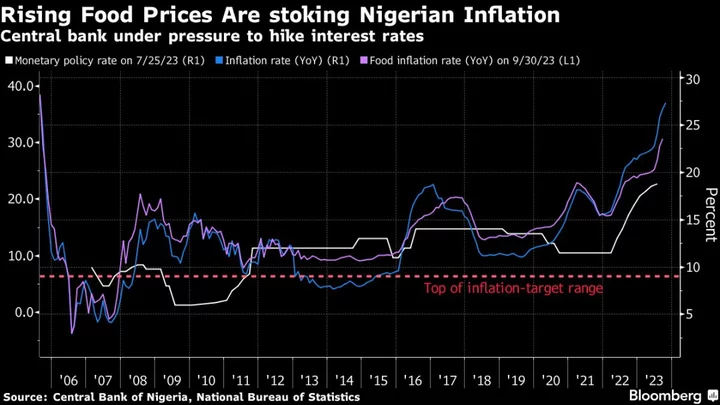Nigerian inflation quickened to a new 18-year high in October as higher input costs and a weaker naira sent food and goods prices soaring, adding pressure on the central bank to raise interest rates.
Consumer prices rose 27.3% from the prior year, compared with 26.7% in September, according to data published on Wednesday on the National Bureau of Statistics’ website. The median of 10 estimates in a Bloomberg survey of economists was 27.7%. Prices rose 1.7% in the month.
Prices in the nation with the second-largest poor population in the world have surged after the easing of foreign-exchange restrictions in June led the naira to plunge 45% and the scrapping of a fuel subsidy a month earlier caused transport costs to almost triple.
Annual food inflation quickened to 31.5% in October from 30.6% and core price growth, which excludes farm-produce and energy costs, accelerated to 22.6% from 21.8%.
To restore price stability, the Abuja-based Central Bank of Nigeria, which is due to convene its first monetary policy committee meeting since July next week, is expected to lift interest rates for a ninth time in a row. It’s already raised rates by 725 basis points since May 2022 to 18.75%.
Read More: Nigeria Increases Bond Yields to Curb Liquidity, Halt Naira Rout
“We expect the MPC to raise the key policy rate further by at least 100 basis points,” said Abdulazeez Kuranga, analyst at Lagos-based Cordros Capital Ltd.
He sees inflation potentially reaching a 28.3% peak in December and said that a hike of that scale will send a strong message that the central bank “is not relenting in its inflation fight, particularly as near-term inflation expectations are tilted to the upside.”
The MPC meeting, expected to be held on Nov. 20-21, will be the first to be chaired by Olayemi Cardoso.
Since becoming governor in September, the central bank under his leadership has worked hard to eradicate financial market dysfunction, aid the slumping currency and mop up excess liquidity.
It’s cleared matured forward foreign-exchange contracts with an unspecified number of banks, lifted a ban on the purchase of dollars on the official market to import 43 specified items and started offering local bonds at higher yields.
The central bank is also working on a document that will set rules to ensure the foreign-exchange market is “predictable and without flip-flops,” Cardoso said last month.
--With assistance from Simbarashe Gumbo.
(Updates with analyst reaction in sixth paragraph.)

